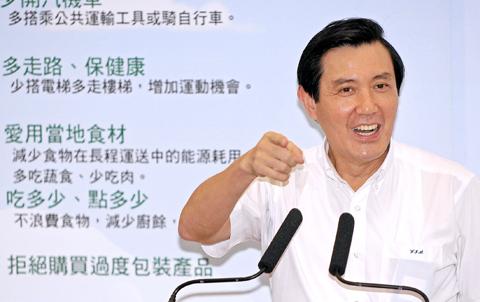On World Environment Day yesterday, nuclear power was listed as an option for the government’s carbon-free energy program as the Cabinet approved sustainable energy policy guidelines.
The move indicated that the new Chinese Nationalist Party (KMT) administration will run counter to the statutory goal of establishing a “nuclear-free homeland,” which the former Democratic Progressive Party (DPP) government pushed through in the Environment Basic Law (環境基本法) in 2002.
Yeh Huey-ching (葉惠青), the director-general of the Ministry of Economic Affairs’ (MOEA) Bureau of Energy, which drew up the draft guidelines, sidestepped that question, saying that “problems related to nuclear power require further deliberation.”

PHOTO: SAM YEH, AFP
Asked about the government’s position on the nation’s three nuclear power plants and the new Fourth Nuclear Power Plant, Yeh said: “We intend to use every means available to reduce carbon emissions. [Nuclear] is the last option to be considered, the last choice.”
Premier Liu Chao-shiuan (劉兆玄) issued a directive at yesterday’s Cabinet meeting to speed up the completion of the Fourth Nuclear Power Plant, to find the best solution to handle nuclear waste and to better communicate with the public about the nuclear power issue, Yeh said.
Yeh said that the percentage of the nation’s electricity derived from nuclear power would not be determined until a planned national energy conference in the latter half of the year.
Currently nuclear power generates 17 percent of Taiwan’s electricity.
Taiwan was the first country in Asia to announce a plan to build a “nuclear-free homeland” when it introduced the law in 2002, a joint decision by the KMT and DPP that sought to end the political standoff that arose from the DPP’s decision in 2000 to halt the construction of the Fourth Nuclear Power Plant.
The plant is scheduled to go on-line late next year.
Based on the law, the former DPP government established a Nuclear-Free Homeland Promotion Commission to publicize the policy and had the MOEA draw up a statute to bring forward the phasing out of the three existing nuclear power plants.
Under its sustainable energy policy guidelines, the KMT administration has vowed to pursue energy efficiency, clean energy and energy stability to create a “win-win-win” situation for energy production, the environment and economic growth.
In terms of energy efficiency, energy intensity — a measure of energy consumption per GDP — should be cut by 20 percent below 2005’s levels by 2015 and further lowered to 50 percent below those levels by 2025, the guidelines said.
The government would be required to increase the percentage of electricity generated by low-carbon fuel to 55 percent of the nation’s requirements by 2025 from the current level of 40 percent and the energy generated by renewable carbon-free sources from the current level of 5 percent to 8 percent by 2025.
“These are all demanding objectives,” Yeh said.
Yeh said that the government would push for the passage of regulations that aim to reduce carbon dioxide emissions, encourage renewable energy production and impose an energy tax.

‘DENIAL DEFENSE’: The US would increase its military presence with uncrewed ships, and submarines, while boosting defense in the Indo-Pacific, a Pete Hegseth memo said The US is reorienting its military strategy to focus primarily on deterring a potential Chinese invasion of Taiwan, a memo signed by US Secretary of Defense Pete Hegseth showed. The memo also called on Taiwan to increase its defense spending. The document, known as the “Interim National Defense Strategic Guidance,” was distributed this month and detailed the national defense plans of US President Donald Trump’s administration, an article in the Washington Post said on Saturday. It outlines how the US can prepare for a potential war with China and defend itself from threats in the “near abroad,” including Greenland and the Panama

The High Prosecutors’ Office yesterday withdrew an appeal against the acquittal of a former bank manager 22 years after his death, marking Taiwan’s first instance of prosecutors rendering posthumous justice to a wrongfully convicted defendant. Chu Ching-en (諸慶恩) — formerly a manager at the Taipei branch of BNP Paribas — was in 1999 accused by Weng Mao-chung (翁茂鍾), then-president of Chia Her Industrial Co, of forging a request for a fixed deposit of US$10 million by I-Hwa Industrial Co, a subsidiary of Chia Her, which was used as collateral. Chu was ruled not guilty in the first trial, but was found guilty

A wild live dugong was found in Taiwan for the first time in 88 years, after it was accidentally caught by a fisher’s net on Tuesday in Yilan County’s Fenniaolin (粉鳥林). This is the first sighting of the species in Taiwan since 1937, having already been considered “extinct” in the country and considered as “vulnerable” by the International Union for Conservation of Nature. A fisher surnamed Chen (陳) went to Fenniaolin to collect the fish in his netting, but instead caught a 3m long, 500kg dugong. The fisher released the animal back into the wild, not realizing it was an endangered species at

DEADLOCK: As the commission is unable to forum a quorum to review license renewal applications, the channel operators are not at fault and can air past their license date The National Communications Commission (NCC) yesterday said that the Public Television Service (PTS) and 36 other television and radio broadcasters could continue airing, despite the commission’s inability to meet a quorum to review their license renewal applications. The licenses of PTS and the other channels are set to expire between this month and June. The National Communications Commission Organization Act (國家通訊傳播委員會組織法) stipulates that the commission must meet the mandated quorum of four to hold a valid meeting. The seven-member commission currently has only three commissioners. “We have informed the channel operators of the progress we have made in reviewing their license renewal applications, and